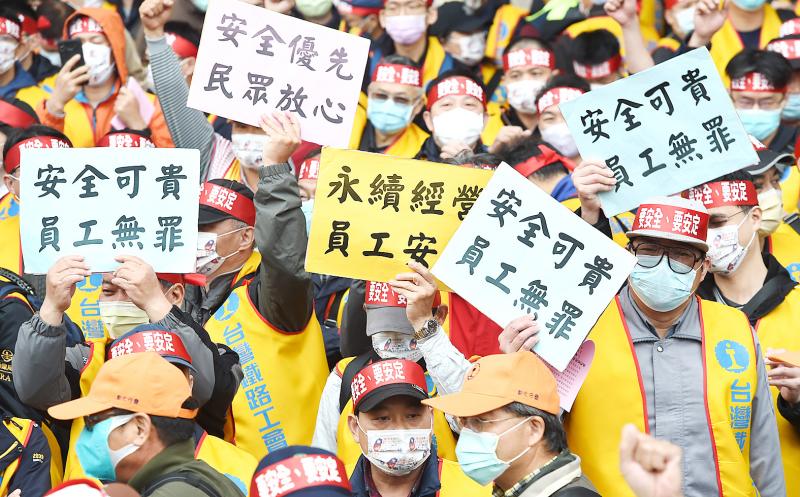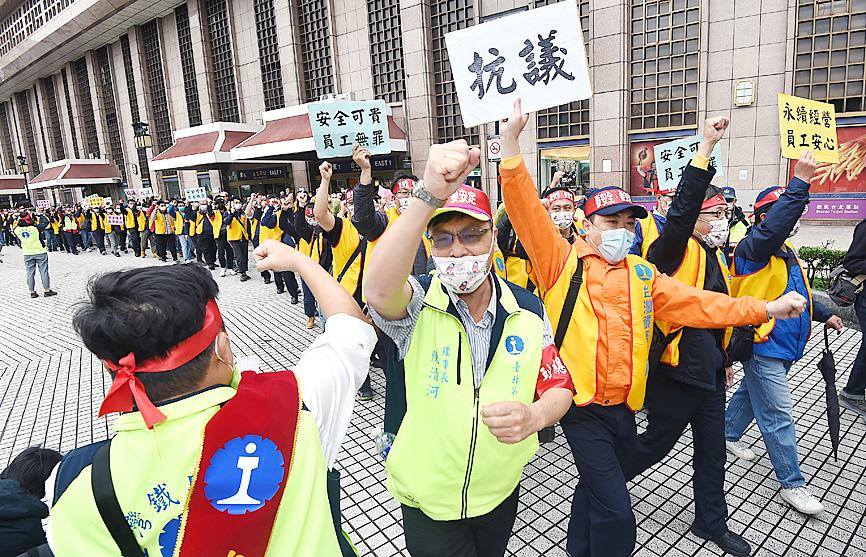More than 1,000 Taiwan Railways Administration (TRA) workers yesterday protested the Ministry of Transportation and Communications’ plan to corporatize the agency, saying that the ministry drafted the statute establishing Taiwan Railway Corp without thoroughly communicating with the workers’ unions.
Members of the Taiwan Railway Labor Union (TRLU) and two other unions in the railway agency marched from Taipei Railway Station to the Legislative Yuan and handed a petition to lawmakers serving on the legislature’s Transportation Committee.
TRLU chairman Chen Shih-chieh (陳世杰) said that the union organized the protest because the ministry sent the draft statute for legislative review without first reaching an agreement with the unions.

Photo: Liao Chen-huei, Taipei Times
“We hope that both the government and legislators can listen to the voice of TRA workers, who have qualms about the ministry’s plan to turn the agency into a state-run corporation,” he said. “We will decide what to do next if we do not get a goodwill response.”
The ministry and the union disagree on 12 articles in the statute, he said, adding that workers do not believe the ministry’s promises of better salaries and benefits.
“Once the agency becomes a state-run corporation, it will sell many of its properties to pay off debts accumulated over the years. Railway services in advanced countries generate 60 percent of their revenue from non-railway-related businesses. How can the TRA make any money and provide more benefits to its workers if it sells its properties?” Chen asked.

Photo: Liao Chen-huei, Taipei Times
The ministry’s proposed amendments to the Railway Act (鐵路法) and the draft statute for the establishment of Taiwan Railway Corp would increase the percentage of the TRA’s non-railway-related business revenue to 60 percent from 17 percent, Minister of Transportation and Communications Wang Kwo-tsai (王國材) told reporters on the sidelines of the Transportation Committee hearing.
The revenue would be used to pay off its accumulated debts of NT$140 billion (US$4.9 billion) and lay a solid foundation for the soon-to-be-established railway corporation, Wang said.
“The Railway Bureau owns and manages properties around high-speed rail stations, and it can allow private users to lease the properties or allow them to develop properties without owning the right of superficies,” he said. “The same principle would apply to Taiwan Railway Corp, which means no land would be sold.”
Wang dismissed accusations that the ministry intends to inflate its property values by turning the TRA into a state-run corporation, saying that “the union has clearly misunderstood him.”
The government relaxed regulations to raise the railway operator’s revenue, which could in turn enhance the safety and quality of the railway service, he said.
Wang said he hoped to have rational discussions with union members at a hearing today concerning their doubts about the ministry’s plan.

POSITIVE DEVELOPMENT: Japan and the US are expected to hold in-depth discussions on Taiwan-related issues during the meeting next month, Japanese sources said The holding of a Japan-US leaders’ meeting ahead of US President Donald Trump’s visit to China is positive news for Taiwan, former Japan-Taiwan Exchange Association representative Hiroyasu Izumi said yesterday. After the Liberal Democratic Party’s landslide victory in Japan’s House of Representatives election, Japanese Prime Minister Sanae Takaichi is scheduled to visit the US next month, where she is to meet with Trump ahead of the US president’s planned visit to China from March 31 to April 2 for a meeting with Chinese President Xi Jinping (習近平). Japan and the US are expected to hold in-depth discussions on Taiwan-related issues during the

‘LIKE-MINDED PARTNER’: Tako van Popta said it would be inappropriate to delay signing the deal with Taiwan because of China, adding he would promote the issue Canadian senators have stressed Taiwan’s importance for international trade and expressed enthusiasm for ensuring the Taiwan-Canada trade cooperation framework agreement is implemented this year. Representative to Canada Harry Tseng (曾厚仁) in an interview with the Central News Agency (CNA) said he was increasingly uneasy about Ottawa’s delays in signing the agreement, especially as Ottawa has warmed toward Beijing. There are “no negotiations left. Not only [is it] initialed, we have three versions of the text ready: English, French and Mandarin,” Tseng said. “That tells you how close we are to the final signature.” Tseng said that he hoped Canadian Prime Minister Mark Carney

President William Lai (賴清德) yesterday bestowed one of Taiwan’s highest honors on Saint Vincent and the Grenadines (SVG) Ambassador Andrea Clare Bowman in recognition of her contributions to bilateral ties. “By conferring the Order of Brilliant Star with Grand Cordon on Ambassador Bowman today, I want to sincerely thank her, on behalf of the Taiwanese people, for her outstanding contribution to deepening diplomatic ties between Taiwan and SVG,” Lai said at a ceremony held at the Presidential Office in Taipei. He noted that Bowman became SVG’s first ambassador to Taiwan in 2019 and

A man walks past elementary school artworks at the Taipei Lantern Festival in Ximen District yesterday, the first day of the event. The festival is to run from 5pm to 10pm through March 15.